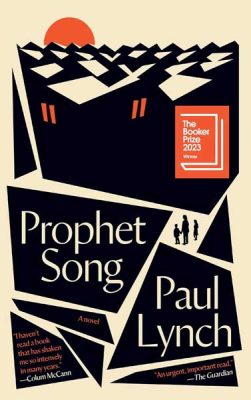‘Prophet’ and Loss in Paul Lynch’s Booker Prize Winner
Review An assessment or critique of a service, product, or creative endeavor such as art, literature or a performance.
By Michael Malone
 “Prophet Song,” by Paul Lynch, looks at Ireland after it has been taken over by a totalitarian government. A civil war has broken out between the army and the rebels. People deemed to be a threat to the government are imprisoned, or worse.
“Prophet Song,” by Paul Lynch, looks at Ireland after it has been taken over by a totalitarian government. A civil war has broken out between the army and the rebels. People deemed to be a threat to the government are imprisoned, or worse.
Such as Larry Stack, a rep in a teachers’ union.
Larry and Eilish have four children, ranging from teens to an infant. Eilish is left to raise the kids by herself, with no idea what happened to Larry, and an increasingly violent setting outside her Dublin home.
“Prophet Song” is a dark, dour book. It is hardly a fun read, but it is one that you may have some trouble putting down.
It is worth noting that paragraphs often go on for a couple pages, and quotes from different characters are embedded in the long paragraphs, not set aside with the line breaks that typically introduce quotes. Sentences go on, and on, for much longer than they normally do.
It takes some getting used to, but the style ultimately lends itself to the claustrophobic, frenzied plot.
One long but moving sentence sees Eilish look in the mirror and reflect on how her life has changed since the bad guys took over and Larry disappeared. “For an instant she sees the past held in an open gaze of the mirror as though the mirror contains all it has seen, seeing herself sleepwalking before the glass, the mindless comings and goings throughout the years, watching herself usher the children out of the car and they are all ages before her and Mark has lost another shoe and Molly is refusing to wear a coat and Larry is asking if they have their schoolbags and she sees how happiness hides in the humdrum…”
The sentence actually goes on for much longer, but “happiness in the humdrum” seemed like a nice way to end it.
“Prophet Song” won the Booker Prize, given to the best novel published in the U.K. in 2023. The Booker Prize is a big deal. On the short list with it were “The Bee Sting” by Paul Murray, “Western Lane” by Chetna Maroo and “This Other Eden,” by Paul Harding, along with a couple other novels.
Lynch’s previous novels include “Red Sky in the Morning,” “The Black Snow” and “Beyond the Sea.”
“Prophet Song” feels particularly timely because a certain U.S. presidential hopeful uses authoritarian language now and then, and Israel’s government seeks to break down judicial oversight of its political leaders.
Things get much worse for Eilish, as her oldest son Mark disappears, and son Bailey ends up in the hospital with shrapnel in his head. Lynch writes: “Another man she saw being carried into the emergency room was wearing just one sports shoe, so many shoes gone astray, she thinks, so many shoes dislodged while their owners are carried by the arms and legs or dragged by the armpits into the backs of cars and vans and dragged again into emergency rooms without a gurney, the orphaned shoes kicked aside in a rush or left to lie on the street or on footpaths like an unblinking eye waiting the return of its owner.”
As the book winds down, Eilish and two of her children, trying to leave the country for Northern Ireland, are locked in a room near the border for several days with 47 people, one bathroom, limited food and a nearby teen playing music on his phone way too loud.
The book has a sparkling 4.23 rating out of 5 on GoodReads, with some 11,500 people rating it.
The critics love “Prophet Song” too.
“I haven’t read a book that has shaken me so intensely in many years,” said Colum McCann, author of “TransAtlantic” and “Let the Great World Spin.”
The Washington Post called the book “a prophetic masterpiece.”
It continues, “If Paul Lynch’s ‘Prophet Song’ were a horror novel, it wouldn’t feel nearly as terrifying. But his story about the modern-day ascent of fascism is so contaminated with plausibility that it’s impossible not to feel poisoned by swelling panic. I woke up three mornings in a row from nightmares Lynch had sown in the soil of my jittery brain.”
I did too. The misery-to-joy ratio in the novel runs around 99 percent to 1 percent, but the story is expertly told and entirely gripping.
If I have any complaints, it’s that I’m not quite sure what the book’s title refers to. But I nonetheless devoured “Prophet Song.” It’s not the kind of novel where you rip off 50 pages in a sitting. For me, it was too much, too heavy, too dark to read much more than 20 pages at a time. “Prophet Song” weighs down on you, and sticks in your head long after you’ve finished it.
The way a very good novel often does.
Journalist Michael Malone lives in Hawthorne with his wife and two children.

Examiner Media – Keeping you informed with professionally-reported local news, features, and sports coverage.
